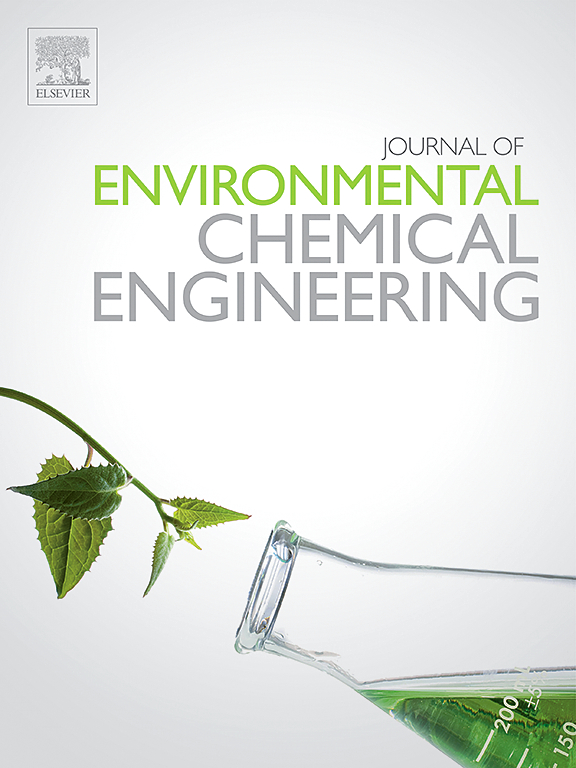Unlocking sustainability: Integrating omics for advanced wastewater treatment
IF 7.4
2区 工程技术
Q1 ENGINEERING, CHEMICAL
引用次数: 0
Abstract
Owing to the urgent and escalating environmental crisis of water pollution through anthropogenic wastewater generated from various sources, the development of novel and innovative bioremediation strategies that are equally sustainable is highly necessitated. The present study embarks on an integrated omics-based exploration, complemented by a thorough literature synthesis, to critically evaluate and enhance hybrid algal-bacterial systems for effective wastewater treatment. Drawing on case studies and research from diverse geographic regions, we explore how these technologies inform the design and optimization of both engineered and natural treatment systems. The review emphasizes the integration of multi-omics data to support sustainable, targeted bioremediation strategies and underscores the cross-disciplinary convergence of environmental engineering, molecular biology, and systems ecology. This global and holistic perspective positions omics as a cornerstone for advancing the next generation of wastewater treatment solutions. Comprehensive analyses of the efficacies of different treatment methods used to remediate organic pollutants, heavy metals, nutrients, and contaminants of emerging concern (CECs), including antibiotic resistance genes (ARGs), were carried out, thus underscoring the pivotal role of microbial diversity and metabolic activity in the complex process of contaminant elimination. While prior research has predominantly focused on isolated components, the current study presents a holistic approach, merging state-of-the-art high-throughput metagenomics and transcriptomics techniques. This innovative combination illuminates the functional dynamics of microbial communities operating within the hybrid system under a range of operational conditions. The primary critical findings reveal significant shifts in microbial community structure and gene expression patterns, which are intricately linked to enhanced efficiencies in nutrient uptake and contaminant removal. In addition, the study also situates these findings within the expansive framework of omics-based bioremediation research, providing a clear and structured pathway for identifying prevailing knowledge gaps and directing future optimization efforts. Collectively, these contributions not only deepen our understanding of microbial community functions but also pave the way for designing next-generation bio-based wastewater treatment systems driven by the intricate interplay of microbial dynamics.
解锁可持续性:整合组学用于高级废水处理
由于各种来源的人为废水造成的水污染所造成的环境危机日益紧迫和不断升级,因此开发具有同样可持续性的新颖和创新的生物修复策略是非常必要的。目前的研究开始了一个综合的基于组学的探索,辅以全面的文献综合,以批判性地评估和增强混合藻-细菌系统的有效废水处理。通过不同地理区域的案例研究和研究,我们探讨了这些技术如何为工程处理系统和自然处理系统的设计和优化提供信息。这篇综述强调了多组学数据的整合,以支持可持续的、有针对性的生物修复策略,并强调了环境工程、分子生物学和系统生态学的跨学科融合。这种全球性和整体性的视角将组学定位为推进下一代废水处理解决方案的基石。综合分析了不同处理方法对有机污染物、重金属、营养物质和新兴关注污染物(CECs),包括抗生素抗性基因(ARGs)的修复效果,从而强调了微生物多样性和代谢活性在复杂的污染物消除过程中的关键作用。虽然之前的研究主要集中在分离的成分上,但目前的研究提出了一种综合的方法,融合了最先进的高通量宏基因组学和转录组学技术。这种创新的组合阐明了在一系列操作条件下在混合系统内运行的微生物群落的功能动态。主要的关键发现揭示了微生物群落结构和基因表达模式的重大变化,这与营养吸收和污染物去除效率的提高有着复杂的联系。此外,该研究还将这些发现置于基于组学的生物修复研究的广阔框架中,为识别普遍存在的知识差距和指导未来的优化工作提供了清晰和结构化的途径。总的来说,这些贡献不仅加深了我们对微生物群落功能的理解,而且为设计由微生物动力学复杂相互作用驱动的下一代生物基废水处理系统铺平了道路。
本文章由计算机程序翻译,如有差异,请以英文原文为准。
求助全文
约1分钟内获得全文
求助全文
来源期刊

Journal of Environmental Chemical Engineering
Environmental Science-Pollution
CiteScore
11.40
自引率
6.50%
发文量
2017
审稿时长
27 days
期刊介绍:
The Journal of Environmental Chemical Engineering (JECE) serves as a platform for the dissemination of original and innovative research focusing on the advancement of environmentally-friendly, sustainable technologies. JECE emphasizes the transition towards a carbon-neutral circular economy and a self-sufficient bio-based economy. Topics covered include soil, water, wastewater, and air decontamination; pollution monitoring, prevention, and control; advanced analytics, sensors, impact and risk assessment methodologies in environmental chemical engineering; resource recovery (water, nutrients, materials, energy); industrial ecology; valorization of waste streams; waste management (including e-waste); climate-water-energy-food nexus; novel materials for environmental, chemical, and energy applications; sustainability and environmental safety; water digitalization, water data science, and machine learning; process integration and intensification; recent developments in green chemistry for synthesis, catalysis, and energy; and original research on contaminants of emerging concern, persistent chemicals, and priority substances, including microplastics, nanoplastics, nanomaterials, micropollutants, antimicrobial resistance genes, and emerging pathogens (viruses, bacteria, parasites) of environmental significance.
 求助内容:
求助内容: 应助结果提醒方式:
应助结果提醒方式:


